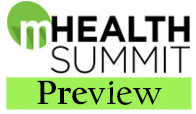Care coordination experts talk best (and worst) practices
 When clinicians in a healthcare setting communicate through mobile devices, they can quickly become part of an effective and efficient care team. Questions and orders are relayed from one member to the next at a moment's notice, medical records can be accessed and healthcare is delivered when and where needed.
When clinicians in a healthcare setting communicate through mobile devices, they can quickly become part of an effective and efficient care team. Questions and orders are relayed from one member to the next at a moment's notice, medical records can be accessed and healthcare is delivered when and where needed.
That's the ideal, anyway.
More and more healthcare providers are using mobile devices to coordinate care, and they're finding some interesting benefits and drawbacks. Representatives of three such health systems will be on hand to tell their stories at an executive breakfast panel on Monday, Dec. 8, at the mHealth Summit 2014.
"The Role of mHealth in Coordinated Care," sponsored by Healthcare IT News and mHealth News, will feature Wes Valdes, DO, medical director of telehealth and virtual medicine at Salt Lake City-based Intermountain Healthcare; Jan Mauck, chief nursing officer at the Sarasota Memorial Health Care System in Florida; as well as C. William Hanson, MD, chief medical information officer, and Neha Patel, MD, assistant professor of clinical medicine, both with Penn Medicine.
Each uses different smartphone-based platforms in the hospital setting, to great success. Whether supplied by the hospital or embedded in an app for a BYOD environment, the process has enabled the three health systems to measure success in a variety of ways, from improved clinical outcomes to increased patient and staff morale to better patient engagement.
Hanson said the use of a secure messaging app replaces paper handoffs with a more secure and effective means of transferring care from nurse to doctor and vice versa. And Mauck pointed out that a smartphone-based communications system brings all members of the care team into constant contact.
Just as important, the panelists said, the communications platform is auditable. All messages are logged, enabling administrators to follow the chain of communications to make sure HIPAA compliance is met and care is delivered properly.
It's a sometimes-tricky landscape. Panelists will point out that they've uncovered inappropriate communications between care team members on occasion, to the point that some employees have been sanctioned for their actions. So while an effective communications platform improves the care environment, it also helps the C-Suite improve risk management.
The consequences can be costly. As an unrelated example, St. Rota's Medical Center in Lima, Ohio, implemented a smartphone-based communications platform several years ago after the hospital lost a lawsuit – to the tune of hundreds of thousands of dollars – because it couldn't prove that a nurse had contacted a physician three times. The new platform enables administrators to track all communications.
Moderated by Patricia Salber, founder and CEO of Health Tech Hatch, the executive breakfast panel takes place from 7-8:30 a.m., on Monday, Dec. 8, in the Potomac C room at the Gaylord National Resort and Conference Center just outside Washington, D.C., and is part of the mHealth Summit 2014. Register for the summit here. And to register for the breakfast, go here.
























